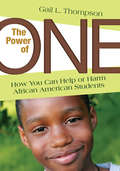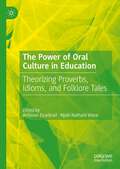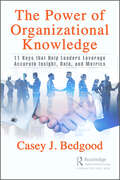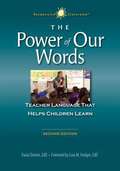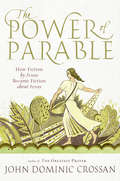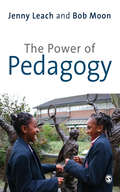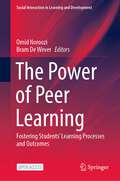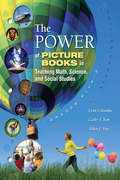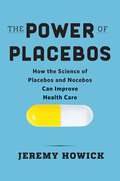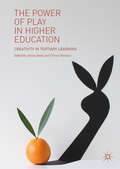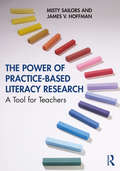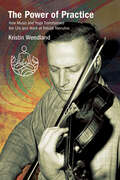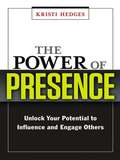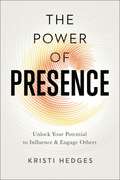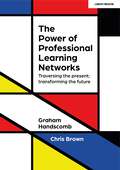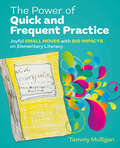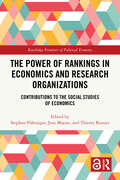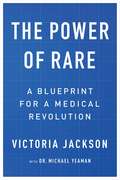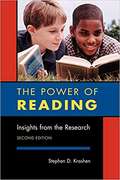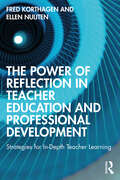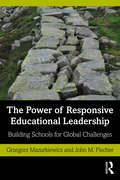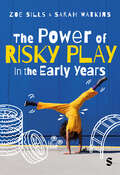- Table View
- List View
The Power of One: How You Can Help or Harm African American Students
by Gail L. ThompsonYOU have the power to make a difference with your African American students! This interactive staff development resource helps educators deal with the main barriers—often personal assumptions or mind-sets—that can impede their progress with African American K–12 students. Calling upon readers to embark upon a personal journey to address these issues, the author skillfully combines moving first-person narratives, personal growth exercises, and informational text, and shows educators how to: Deal with obstacles to successful classroom management; Foster positive interactions within the classroom; Prepare African American students to succeed on standardized tests; Build positive relationships with African American parents.
The Power of Oral Culture in Education: Theorizing Proverbs, Idioms, and Folklore Tales
by Njoki Nathani Wane Ardavan EizadiradThis volume explores the importance of inter-generational oral culture and stories that transcend time, space, and boundaries transmitted historically from one generation to the next through proverbs, idioms, and folklore tales in different geographical and spatial contexts. These important stories and their embedded life lessons are introduced, explained, and supplemented with pre and post educational activities and lesson plans to be used as learning resources. The centering of orality as a tool and medium for educating the future generation is a reclamation and reaffirmation of Indigeneity, Indigenous knowledges. and non-hegemonic approaches to support students in a socio-culturally sustaining manner. Through this understanding, this book explores the interconnectedness between culture, traditions, language, and way of life through oral storytelling, sharing, and listening.
The Power of Organizational Knowledge: 11 Keys that Help Leaders Leverage Accurate Insight, Data, and Metrics
by Casey J. BedgoodIs knowledge powerful? Do leaders and those aspiring really understand the importance and power of organizational knowledge? Can knowing accelerate one’s career journey, while not knowing disrupt success? Will leaders and organizations achieve their full potential and mission without leveraging organizational knowledge? This book is for leaders, aspiring leaders, professionals, students, performance improvement practitioners, and strategists regardless of industry. It provides a quick, clear, and concise guide for readers to understand organizational knowledge, create knowledge transfer plans, and leverage knowledge to lead from the front. Without knowledge, leaders and their organizations will eventually operationally perish. In this book, leaders will learn the power of the following: • Strategic knowledge• Knowledge related to organizational governance and structure• Creating knowledge plans and capturing and sharing knowledge• Leveraging organizational knowledge in integrating organizations and building teams• Knowledge in leadership decision making
The Power of Our Words: Teacher Language that Helps Children Learn (Second Edition)
by Paula DentonSimple changes in a teacher's language can bring about profound changes in students and classrooms. By paying attention to your words and tone of voice, you will: Increase students' engagement with academicsBuild positive communityMore effectively manage your classroom That is the message of The Power of Our Words, a book that has changed the teaching lives of tens of thousands of educators since it was first published in 2007. In this updated second edition you will find practical information to help you: Lead students in envisioning themselves achieving successUse questions that encourage deep and creative thinkingListen to students in ways that support their growthReinforce students efforts and remind or redirect them when they go off track. Throughout, you will find an increased emphasis on using teacher language to support academic engagement and critical thinking skills as called for in the Common Core State Standards. And an updated, livelier format makes this second edition even easier to read.
The Power of Parable: How Fiction by Jesus Became Fiction about Jesus
by John Dominic CrossanIn 1969, I was teaching at two seminaries in the Chicago area. One of my courses was on the parables by Jesus and the other was on the resurrection stories about Jesus. I had observed that the parabolic stories by Jesus seemed remarkably similar to the resurrection stories about Jesus. Were the latter intended as parables just as much as the former? Had we been reading parable, presuming history, and misunderstanding both? -from The Power of Parable So begins the quest of renowned Jesus scholar John Dominic Crossan as he unlocks the true meanings and purposes of parable in the Bible so that modern Christians can respond genuinely to Jesus's call to fully participate in the kingdom of God. In The Power of Parable, Crossan examines Jesus's parables and identifies what he calls the "challenge parable" as Jesus's chosen teaching tool for gently urging his followers to probe, question, and debate the ideological absolutes of religious faith and the presuppositions of social, political, and economic traditions. Moving from parables by Jesus to parables about Jesus, Crossan then presents the four gospels as "megaparables." By revealing how the gospels are not reflections of the actual biography of Jesus but rather (mis)interpretations by the gospel writers themselves, Crossan reaffirms the power of parables to challenge and enable us to co-create with God a world of justice, love, and peace.
The Power of Pedagogy
by Jenny Leach Robert E. Moon'[This book] is readable, engaging, informative and provoking' - Tony Rae, ESCalate 'The book is encompassing all my own passions as a holistic practitioner; I feel it is multi-cultural, offering powerfully diverse and inclusive ideas of pedagogy. In particular, the concepts of this book are like a breath of fresh air for the 'disabled' student, talking about alternative assessment etc.' - Helene McArthur, ESCalate `Every now and again you come across a really important book that shifts and clarifies your thinking. The Power of Pedagogy is one of those books. Here you'll find a fascinating analysis of the myriad of issues and ideas surrounding teaching and learning today. Drawing on history, theory and vignettes form today's classrooms, these two experienced and active thinkers and practitioners have managed to provide new perspectives on the pedagogic mission. A remarkable piece of scholarship, it's a 'must' for all those setting out to teach and for those already teaching with the sort of intellectual curiosity that is the hallmark of the outstanding teacher' - Tim Brighouse, formerly Adviser for London Schools, is Visiting Professor at the Institute of Education 'This important book manages to combine an illuminating breadth of global reference with real insight into the practice of teaching and learning. Its highly readable investigative narrative integrates theory and practice with a quality of analysis that is both rare and entirely convincing' - Sir David Winkley, former Headteacher Grove School, Handsworth and government education advisor The concept of 'pedagogy' has become increasingly important as a frame of reference for debate about teaching and learning. In this book the authors analyse and explore contemporary ideas of pedagogy through the work of key figures including Freire, Montessori and Vygotsky, and explain how a new conception of pedagogy could transform educational institutions, particularly schools. In locating pedagogy as central to the process of education the authors: - explore the historical and cultural antecedents of our understanding of pedagogy - analyse the way understanding of the working of the human mind influences teaching and learning - review and critique ideas about learning and the construction of knowledge - examine the way new forms of communication are impacting on the processes and purposes of pedagogic activity. Highly relevant for masters and doctoral students of education, this book will also be of interest to educational practitioners undertaking research on issues related to pedagogy, both in the UK and internationally. Bob Moon and the late Jenny Leach have written extensively on pedagogy, teacher education and international developments in the field, including Learners and Pedagogies (1999). They lead the Research Group on Teacher Education across Societies and Cultures (RITES) at the Open University, UK. Bob Moon is Professor of Education at the Open University and Director of the Teacher Education in Sub-Saharan Africa (TESSA) Programme. Jenny Leach was Professor of Teacher Learning and Development at the Open University.
The Power of Peer Learning: Fostering Students’ Learning Processes and Outcomes (Social Interaction in Learning and Development)
by Omid Noroozi Bram De WeverThis open access book explores new developments in various aspects of peer learning processes and outcomes. It brings together research studies examining how peer feedback, peer assessment, and small group learning activities can be designed to maximize learning outcomes in higher, but also secondary, education.Conceptual models and methodological frameworks are presented to guide teachers and educational designers for successful implementation of peer learning activities with the hope of maximizing the effectiveness of peer learning in real educational classrooms.There is a strong emphasis on how technology-enhanced tools can advance peer learning, both with respect to designing and implementing learning activities, as well as analyzing learning processes and outcomes.By providing empirical studies from different peer learning initiatives, both teachers and students in academic and professional contexts are informed about the state of the art developments of peer learning.This book contributes to the understanding of peer learning challenges and solutions in all level of education and provide avenues for future research. It includes theoretical, methodological, and empirical chapters which makes it a useful tool for both teaching and research.
The Power of Picture Books in Teaching Math and Science: Grades Prek-8
by Lynn ColumbiaThis book's 50-plus lessons-each based on a different picture book or story-will help classroom teachers build a foundation for teaching math, science, and social studies concepts to their students. Each lesson uses children's literature to make challenging, abstract concepts relevant to children's lives, inviting them to learn these concepts while responding to a story's illustrations, theme, characters, and plot. The lessons also demonstrate how teachers can use children's literature to meet national standards in math, science, and social studies. Chapters 1 through 5 set the stage for using picture books, discussing the effective, imaginative integration of literature into the classroom. Teachers will learn to create an environment that ensures that when children and books come together, the experience is enjoyable and thought provoking. Chapters 6 through 9 provide individual lessons, by grade level, with detailed activities based on specific books.
The Power of Place, the Problem of Time
by Keith Thor CarlsonThe Indigenous communities of the Lower Fraser River, British Columbia (a group commonly called the Stó:lõ), have historical memories and senses of identity deriving from events, cultural practices, and kinship bonds that had been continuously adapting long before a non-Native visited the area directly. In The Power of Place, the Problem of Time, Keith Thor Carlson re-thinks the history of Native-newcomer relations from the unique perspective of a classically trained historian who has spent nearly two decades living, working, and talking with the Stó:lõ peoples.Stó:lõ actions and reactions during colonialism were rooted in their pre-colonial experiences and customs, which coloured their responses to events such as smallpox outbreaks or the gold rush. Profiling tensions of gender and class within the community, Carlson emphasizes the elasticity of collective identity. A rich and complex history, The Power of Place, the Problem of Time looks to both the internal and the external factors which shaped a society during a time of great change and its implications extend far beyond the study region.
The Power of Placebos: How The Science Of Placebos And Nocebos Can Improve Health Care
by Jeremy HowickThe Power of Play in Higher Education: Creativity in Tertiary Learning
by Alison James Chrissi NerantziThis book examines the increasing popularity of creativity and play in tertiary learning, and how it can be harnessed to enhance the student experience at university. While play is often misunderstood as something ‘trivial’ and associated with early years education, the editors and contributors argue that play contributes to social and human development and relations at a fundamental level. This volume invalidates the commonly held assumption that play is only for children, drawing together numerous case studies from higher education that demonstrate how researchers, students and managers can benefit from play as a means of liberating thought, overturning obstacles and discovering fresh approaches to persistent challenges. This diverse and wide-ranging edited collection unites play theory and practice to address the gulf in research on this fascinating topic. It will be of interest and value to educators, students and scholars of play and creativity, as well as practitioners and academic leaders looking to incorporate play into the curriculum.
The Power of Practice-Based Literacy Research: A Tool for Teachers
by James V. Hoffman Misty SailorsAccessible and inviting, this book showcases how teachers and literacy coaches can use research as a tool to teach literacy effectively and with intention. Sailors and Hoffman invite literacy specialists and practicing and preservice teachers into a conversation about how they can use research as means for professional learning, mentorship, and empowerment. Chapters feature a wealth of tools, examples, and strategies that make key concepts in literacy research refreshing and practical. This book invites the reader to pause and reflect on the practical knowledge through special features in the book and available online as eResources, including: "Points to Consider" boxes to encourage reflection and deeper thinking "Pause and Reflect" boxes to give the reader space to apply concepts to their own work as practice-based researchers eResources with recommended readings and "Meet the Teacher" exemplars of teachers’ stories to provoke further reflection, available on the book’s webpage: www.routledge.com/9780367177607 Perfect for literacy specialists, coaches and consultants in literacy, ELA/literacy teachers, as well as preservice teachers, this book is a comprehensive and engaging guide to using research as a means to transform classrooms.
The Power of Practice: How Music and Yoga Transformed the Life and Work of Yehudi Menuhin (SUNY Press Open Access)
by Kristin WendlandThe Power of Practice showcases the pioneering achievements of renowned violinist Yehudi Menuhin (1916-99) and how both disciplines transformed his life and practice. Menuhin's contributions as a performer, teacher, and humanitarian are celebrated around the world. Less well known, however, is Menuhin's devotion to the practice of yoga and his close friendship with the renowned yogi B. K. S. Iyengar (1918–2014), whose guidance profoundly influenced Menuhin as both a musician and a philanthropist. Menuhin applied his understanding of Iyengar's teachings to his philosophy of musical practice, creating new ways to approach the teaching of violin technique. He also took broader lessons from yoga to inform his approach to interacting with the larger world as a cultural ambassador and influential artist. Through the lens of the life and work of the celebrated violinist and devoted yogi, this book uncovers deep connections between music and yoga. It shows how the practice of both disciplines can profoundly transform our world into a better place.
The Power of Presence: Unlock Your Potential to Influence and Engage Others
by Kristi HedgesEveryone recognizes leaders with presence. They stand out for their seemingly innate ability to command attention and inspire commitment. But what is this secret quality they exude, exactly? Executive and CEO coach Kristi Hedges demystifies this elusive trait, revealing that leadership presence is the intersection of outward influencing skills and internal mental conditioning. Using her I-Presence model, the author shows how anyone regardless of position or personality can strengthen their impact. Readers will learn how to build trust as the foundation for leadership, eschew perfectionism for authenticity, banish limiting thoughts and behaviors, and galvanize their team through visionary, inspiring communications. Stellar technical knowledge, a strong work ethic, excellent presentation skills none of these tangible traits puts people on the career fast track as readily as a compelling presence. Filled with profiles of leaders with powerful presence and the latest neuroleadership research translated into actionable habits, this authoritative guide puts a little-understood, but potentially game-changing, tool within everyones reach.
The Power of Presence: Unlock Your Potential to Influence and Engage Others
by Kristi HedgesEveryone, regardless of position or personality, can strengthen their presence. The Power of Presence shows how.When some people speak, everyone listens. When they need commitment to projects, others jump on board. They just seem to have that indescribable &“presence&”--a subtle magnetic field around them wherever they go that signals authority and authenticity and attracts disciples with ease. Wouldn&’t it be incredible if doors opened as effortlessly for you? How amazing would it be if you could command the room like they do? You don&’t have to wonder; you can make it happen!Filled with strategies, exercises, and personal stories from years spent coaching leaders, communications expert Kristi Hedges explains how to:Build relationships based on trustRid yourself of limiting behaviorsEmbody the values you are trying to conveyExplore how others see you and correct misperceptionsCommunicate in way that inspireThe key is to cultivate the communication aptitude, mental attitude, and unique leadership style needed to connect with and motivate others. Everyone recognizes a commanding presence when they see it, and soon they&’ll see it in you!
The Power of Professional Learning Networks: Traversing the present; transforming the future
by Chris Brown Graham HandscombNow, more than ever, it seems that the age of professional learning networks has well and truly arrived. The rise and proliferation of digital communication, coupled with the circumstances enforced during the pandemic experience, have led to a dynamic re-imagining of Professional Learning Networks (PLNs) – both in terms of what they are for and what they can achieve. Set against this context this book provides a stimulating insight into the current state of the art of professional learning networks and the transformative difference they are poised to make to our educational future. Drawing on a wealth of expertise, each chapter is written by leading thinkers and doers in the field, and covers a range of topics and emerging areas. These include: the professional learning vistas opened up through digital opportunities; how these networks have helped to enhance teachers’ identity and sense of well-being: the new sense of practitioner ownership and partnership now at the heart of PLNs; new openings for professionalization; how PLNs have become vehicles for radically different forms of professional development and learning; and what this all means for school leadership.
The Power of Professional Learning Networks: Traversing the present; transforming the future
by Chris Brown Graham HandscombNow, more than ever, it seems that the age of professional learning networks has well and truly arrived. The rise and proliferation of digital communication, coupled with the circumstances enforced during the pandemic experience, have led to a dynamic re-imagining of Professional Learning Networks (PLNs) – both in terms of what they are for and what they can achieve. Set against this context this book provides a stimulating insight into the current state of the art of professional learning networks and the transformative difference they are poised to make to our educational future. Drawing on a wealth of expertise, each chapter is written by leading thinkers and doers in the field, and covers a range of topics and emerging areas. These include: the professional learning vistas opened up through digital opportunities; how these networks have helped to enhance teachers’ identity and sense of well-being: the new sense of practitioner ownership and partnership now at the heart of PLNs; new openings for professionalization; how PLNs have become vehicles for radically different forms of professional development and learning; and what this all means for school leadership.
The Power of Quick and Frequent Practice: Joyful Small Moves with Big Impacts on Elementary Literacy
by Tammy MulliganWhat can students really accomplish when they practice something for just a few minutes a day? Quite a lot, as Tammy Mulligan illustrates in The Power of Quick and Frequent Practice: Joyful Small Moves with Big Impacts on Elementary Literacy.Come along as we follow classroom teacher Tammy Mulligan’s journey to plan and facilitate small but powerful moments of practice that help students grow as readers, writers, and community members. Chapter by chapter, Mulligan explores how to bring different categories of quick and frequent practice to life in the classroom including:● Quick and Frequent Phonics Moves● Quick and Frequent Fluency Moves● Quick and Frequent Comprehension Moves● Quick and Frequent Moves To Help Readers Lead● Quick and Frequent Moves to Connect with FamiliesWritten with the practical lens of a teacher, The Power of Quick and Frequent Practice outlines how to make these practice moves a part of daily and weekly instructional routines, utilize simple tools you already have in your classroom, and weave moments of student leadership throughout the practice times to help children celebrate their growth. Mulligan shares strategies, routines, and tips for planning, managing, and implementing the kind of engaging and meaningful literacy practice that learners need.The Power of Quick and Frequent Practice illustrates that small moves can have a big impact on children's literacy learning!
The Power of Rankings in Economics and Research Organizations: Contributions to the Social Studies of Economics (Routledge Frontiers of Political Economy)
by Stephan Pühringer Jens Maesse Thierry RossierDiscourses around research excellence and quality are predominant within the economic sciences, with various forms of ranking playing a central role. They make “excellence” in research and teaching visible, but they also create hierarchical orders between researchers, institutions, publication outlets and countries.The authors of this volume analyse the role of rankings in shaping and transforming economics from different theoretical, methodological and disciplinary perspectives. The various contributions explore the specific situation in different countries as well as global developments within economics and beyond. In addition, the book contributes to an overall debate about the role and function of rankings in academia. The analysis focuses on four aspects: rankings and social hierarchies, rankings and paradigmatic hegemonies, rankings and regulations/policies, as well as rankings and critique/alternatives.The book addresses scholars in economic sociology, economics, higher education and science studies.
The Power of Rare: A Blueprint for a Medical Revolution
by Victoria Jackson Dr Michael Yeaman"The Power of Rare is equal parts science and inspiration. In her urgent drive to help her daughter, Victoria Jackson not only transformed the competitive world of biomedical research, but also created a new medical model for generations to come." —Arianna HuffingtonVictoria Jackson revolutionized the beauty industry in the 1980s and '90s with her "no make-up" approach to make-up and ultimately made Victoria Jackson Cosmetics into a billion-dollar global brand. But her greatest test of the power of rare didn't come until her daughter, Ali, was diagnosed with neuromyelitis optica, or NMO—a rare, life-threatening autoimmune disease—and Victoria, driven by a mother's love, set out to find a cure for her daughter. Within days of hearing Ali's diagnosis in 2008, Victoria began the Guthy-Jackson Charitable Foundation to fund medical research into this often misdiagnosed orphan disease. Her "blueprint" called for breaking down the so-called silos of traditional medical research and bringing together some of the greatest minds to collaborate and share their findings. She hadn't expected to galvanize how medical research works, but within only a few years, that's just what she did. By focusing on the "rare" in each of us, the foundation has catalyzed breakthroughs in NMO in record time. These advances are also opening new doors to solving MS, lupus, and other autoimmune diseases—plus diseases that are not so rare, including cancer, infection, aging, and more. It has been Victoria's guiding philosophy that if she can do it, anyone can. With The Power of Rare, she shares how the foundation harnessed the power of rare to speed discoveries that help patients. Through her business savvy, wit, and heart, she offers real-world advice and inspiration for others to tap into "rare" to empower their own breakthroughs.
The Power of Reading: Insights From the Research
by Stephen D. KrashenContinuing the case for free voluntary reading set out in the book's 1993 first edition, this new, updated, and much-looked-for second edition explores new research done on the topic in the last ten years as well as looking anew at some of the original research reviewed. <p><p> Krashen also explores research surrounding the role of school and public libraries and the research indicating the necessity of a print-rich environment that provides light reading (comics, teen romances, magazines) as well as the best in literature to assist in educating children to read with understanding and in second language acquisition. He looks at the research surrounding reading incentive/rewards programs and specifically at the research on AR (Accelerated Reader) and other electronic reading products.
The Power of Reflection in Teacher Education and Professional Development: Strategies for In-Depth Teacher Learning
by Fred Korthagen Ellen NuijtenBased on years of extensive research on teacher development, this book offers a practical introduction to the concept of teacher reflection, demonstrating how student teachers can engage with reflective learning from their teaching and classroom experiences in a systematic and inspiring way. Providing practical models and guidelines for use in the classroom, renowned teacher educators Fred Korthagen and Ellen Nuijten outline various strategies for promoting reflection and illustrate how a deeper form of reflection ・ ‘core reflection’ ・ enhances awareness of professional identity and supports the dismantling of inner obstacles, therefore enhancing social justice and empowering diverse student populations. The authors demonstrate how a trajectory for learning can be designed to develop key competencies, as well as the role played by university- and school-based teacher educators in supporting teachers’ self-directed reflection. Featuring a variety of tools that support professional growth, this unique text demystifies the area of teacher reflection, helping to provide concrete and inspiring examples for how to strengthen professional identity based on everyday challenges faced by practitioners. The Power of Reflection in Teacher Education and Professional Development is therefore an essential guide for students, in-service teachers, and teacher educators alike, as well as for anyone in the helping professions.
The Power of Responsive Educational Leadership: Building Schools for Global Challenges
by Grzegorz Mazurkiewicz John M. FischerThe Power of Responsive Educational Leadership examines how educational leaders might respond to global challenges such as the environment, technology, inequity, the health crisis, and the stability of democracy. It draws on models of educational leadership and development projects from around the world to explore how leaders might use the curriculum and teaching to help move their communities, regions, and countries in positive directions. The authors argue that educational leadership needs to move away from authoritarian or transactional bureaucracy and toward leadership in a participatory mode that feels responsible for the children and adults in their institution and responsible for the society they all inhabit. The Power of Responsive Educational Leadership: Offers a comprehensive exploration of the multifaceted nature of leadership for learning Charts the key thinking and practices that engage with the principles of leadership for learning and the implications these have Provides a variety of fresh perspectives on the connections between education, schooling, and leadership Includes a range of internationally diverse case studies and vignettes This comprehensive guide invites readers to engage in thinking about new directions for education today. The book will be a useful starting point for individuals who choose to engage in discussions and deliberations around what it means to be responsive. It will be invaluable for those who are working as principals and teachers or participating in education leadership development programs around the world and hope to work in various roles.
The Power of Risky Play in the Early Years
by Sarah Watkins Zoe sillsHarness the learning Power of Risky Play in the Early Years. Now, more than ever, children need to develop autonomy and decision-making skills. Too often in Early Years settings, opportunities for learning through risky play are missed. In this book, Zoe Sills and Sarah Watkins support you to overcome the barriers to embedding and allowing space for risky play in your setting. *Know the value of Risky Play *Create a learning environment that encourages and supports Risky Play *Feel confident to allow the time and space for Risky Play *Develop a better understanding of risk and learning. Children know what they need for their bodies and minds. Through self-directed play, children naturally challenge themselves. They test their physical and emotional boundaries as part of cognitive and physical development. We should be supporting this child-led learning in the Early Years, not limiting it. This book helps you to do this - to harness the learning power of Risky Play.
The Power of Risky Play in the Early Years
by Sarah Watkins Zoe sillsHarness the learning Power of Risky Play in the Early Years. Now, more than ever, children need to develop autonomy and decision-making skills. Too often in Early Years settings, opportunities for learning through risky play are missed. In this book, Zoe Sills and Sarah Watkins support you to overcome the barriers to embedding and allowing space for risky play in your setting. *Know the value of Risky Play *Create a learning environment that encourages and supports Risky Play *Feel confident to allow the time and space for Risky Play *Develop a better understanding of risk and learning. Children know what they need for their bodies and minds. Through self-directed play, children naturally challenge themselves. They test their physical and emotional boundaries as part of cognitive and physical development. We should be supporting this child-led learning in the Early Years, not limiting it. This book helps you to do this - to harness the learning power of Risky Play.
